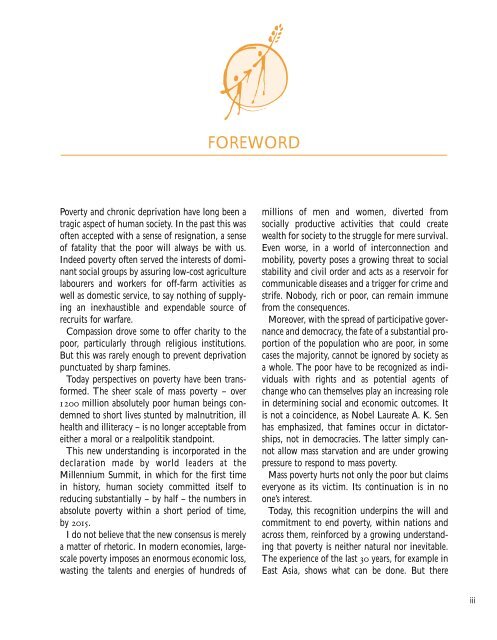THE CHALLENGE OF ENDING RURAL POVERTY - IFAD
THE CHALLENGE OF ENDING RURAL POVERTY - IFAD
THE CHALLENGE OF ENDING RURAL POVERTY - IFAD
You also want an ePaper? Increase the reach of your titles
YUMPU automatically turns print PDFs into web optimized ePapers that Google loves.
FOREWORD<br />
Poverty and chronic deprivation have long been a<br />
tragic aspect of human society. In the past this was<br />
often accepted with a sense of resignation, a sense<br />
of fatality that the poor will always be with us.<br />
Indeed poverty often served the interests of dominant<br />
social groups by assuring low-cost agriculture<br />
labourers and workers for off-farm activities as<br />
well as domestic service, to say nothing of supplying<br />
an inexhaustible and expendable source of<br />
recruits for warfare.<br />
Compassion drove some to offer charity to the<br />
poor, particularly through religious institutions.<br />
But this was rarely enough to prevent deprivation<br />
punctuated by sharp famines.<br />
Today perspectives on poverty have been transformed.<br />
The sheer scale of mass poverty – over<br />
1200 million absolutely poor human beings condemned<br />
to short lives stunted by malnutrition, ill<br />
health and illiteracy – is no longer acceptable from<br />
either a moral or a realpolitik standpoint.<br />
This new understanding is incorporated in the<br />
declaration made by world leaders at the<br />
Millennium Summit, in which for the first time<br />
in history, human society committed itself to<br />
reducing substantially – by half – the numbers in<br />
absolute poverty within a short period of time,<br />
by 2015.<br />
I do not believe that the new consensus is merely<br />
a matter of rhetoric. In modern economies, largescale<br />
poverty imposes an enormous economic loss,<br />
wasting the talents and energies of hundreds of<br />
millions of men and women, diverted from<br />
socially productive activities that could create<br />
wealth for society to the struggle for mere survival.<br />
Even worse, in a world of interconnection and<br />
mobility, poverty poses a growing threat to social<br />
stability and civil order and acts as a reservoir for<br />
communicable diseases and a trigger for crime and<br />
strife. Nobody, rich or poor, can remain immune<br />
from the consequences.<br />
Moreover, with the spread of participative governance<br />
and democracy, the fate of a substantial proportion<br />
of the population who are poor, in some<br />
cases the majority, cannot be ignored by society as<br />
a whole. The poor have to be recognized as individuals<br />
with rights and as potential agents of<br />
change who can themselves play an increasing role<br />
in determining social and economic outcomes. It<br />
is not a coincidence, as Nobel Laureate A. K. Sen<br />
has emphasized, that famines occur in dictatorships,<br />
not in democracies. The latter simply cannot<br />
allow mass starvation and are under growing<br />
pressure to respond to mass poverty.<br />
Mass poverty hurts not only the poor but claims<br />
everyone as its victim. Its continuation is in no<br />
one’s interest.<br />
Today, this recognition underpins the will and<br />
commitment to end poverty, within nations and<br />
across them, reinforced by a growing understanding<br />
that poverty is neither natural nor inevitable.<br />
The experience of the last 30 years, for example in<br />
East Asia, shows what can be done. But there<br />
iii

















